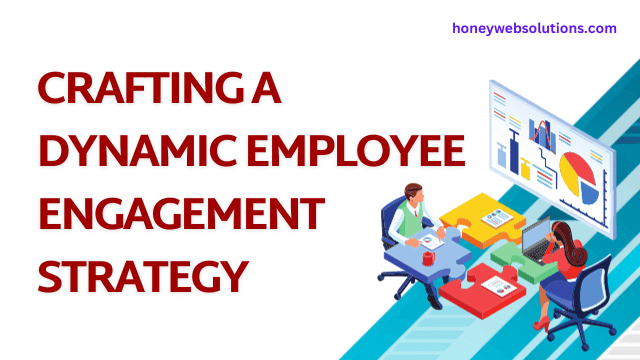

Employee engagement isn’t just a buzzword; it’s a crucial element in building a thriving and productive workplace. When employees are engaged, they are more motivated, satisfied, and committed to their work. This leads to higher productivity, reduced turnover, and better business outcomes. But crafting a dynamic employee engagement strategy that works for your organization isn’t a one-size-fits-all endeavor. It requires thoughtful planning, ongoing effort, and adaptability. In this article, we’ll explore the key components of a dynamic employee engagement strategy that can help you foster a workplace where employees are enthusiastic, committed, and driven to succeed.
Table of Contents
Before diving into strategy, let’s clarify what employee engagement means. Employee engagement is more than just job satisfaction. It is about employees’ emotional connections to their work, colleagues, and the organization as a whole. Employees who are engaged and enthusiastic about their jobs go above and beyond and are more likely to stay with the company in the long run.
Your employees are your best source of information when understanding what engages them. Regularly collect feedback through surveys, one-on-one discussions, and team meetings. Listen to their concerns, ideas, and suggestions. This will help you identify improvement areas and show employees that their voices are valued.
One of the fundamental drivers of employee engagement is knowing what is expected of them. Clearly define job roles, responsibilities, and performance expectations. This clarity eliminates confusion and empowers employees to focus on their tasks, knowing they contribute to the organization’s success.
Employees who see a path for growth within the organization are more likely to be engaged. Invest in training, mentorship programs, and ongoing skill development. Offer opportunities for advancement and promotions based on performance. Employees who see a future with your company are more likely to stay committed.
A positive work environment is essential for employee engagement. Encourage collaboration, teamwork, and open communication. Celebrate achievements, no matter how small, and create a culture of appreciation and recognition. A simple “thank you” can go a long way in boosting morale.
Employee engagement isn’t just about pushing employees to work harder. It’s about finding the right balance between workload and well-being. Overloading employees with excessive tasks and deadlines can lead to burnout and disengagement. Ensure that workloads are manageable and encourage regular breaks to recharge.
Due to the changed perspective of people in the recent few years, flexibility has become a key to engaging employees. Offering flexible work arrangements, such as remote work options or flexible hours, can significantly improve employee satisfaction and work-life balance.
Recognition and rewards are powerful motivators. Implement a system that acknowledges and rewards outstanding performance. This can include monetary bonuses, promotions, or simply public acknowledgment of a job well done. Recognizing and rewarding employees for their efforts reinforces their commitment to the organization.
A healthy workforce is a more engaged one. Promote physical and mental well-being by offering wellness programs, access to fitness facilities, or mental health resources. Employees who feel their well-being is a priority are more likely to be engaged and focused on their work.
Trust is the foundation of any successful engagement strategy. Be transparent in your communication, share organizational goals and challenges, and involve employees in decision-making processes when appropriate. Trusting employees to contribute to the company’s success fosters a sense of ownership and engagement.
We live in a fast-paced world, and work-life balance is essential for employee well-being and engagement. Encourage employees to disconnect from work after hours and take their vacation days. Employees who feel they can maintain a healthy balance are more likely to be engaged and motivated.
An effective employee engagement strategy is not a one-and-done endeavor. It requires continuous monitoring and improvement. Collect feedback regularly, assess the impact of your initiatives, and adjust your strategy accordingly. Employee engagement is an ongoing journey, not a destination.
A diverse and inclusive workplace is more likely to have engaged employees. Embrace diversity in your organization and create an inclusive environment where all employees feel valued and respected. This not only improves engagement but also enhances creativity and innovation.
Technology can play a significant role in employee engagement. Utilize communication and collaboration tools to connect with remote teams, facilitate discussions, and share updates. Leverage data analytics to track engagement levels and identify areas for improvement.
To gauge the effectiveness of your strategy, you need to measure employee engagement. Use surveys, feedback forms, and key performance indicators (KPIs) to track engagement levels over time. This data will help you identify trends and areas that need attention.
The business landscape is constantly evolving, and so should your employee engagement strategy. Be prepared to adapt to change due to external factors like economic shifts or internal changes within your organization. Flexibility is key to maintaining a dynamic and effective strategy.
Investing in employee engagement is not an option; it’s a necessity for modern businesses. A dynamic employee engagement strategy that prioritizes communication, growth, and well-being can lead to higher productivity, reduced turnover, and a more positive workplace culture. When employees are engaged, they become your organization’s greatest asset, driving success and growth.
Crafting a dynamic employee engagement strategy requires understanding your employees, creating a positive work environment, and continuously adapting to their needs. By investing in an effective employee engagement strategy, you’re not only fostering a more productive workforce but also building a stronger, more resilient organization poised for long-term success.
Dropped calls, distorted audio, and unexpected lags—these are the kinds of problems that can quickly… Read More
A few years ago, building a brand meant weeks of brainstorming, hiring designers, and refining… Read More
Are you wondering how to streamline your study plan effectively? Do you feel overwhelmed by… Read More
In today’s world, where the digital revolution accelerates by the second, technology is not just… Read More
When your business runs paid ads across multiple platforms—Google, Meta, LinkedIn, and the rest—it’s easy… Read More
Among many students, are you also dreaming of studying in your favorite destination, America? Many… Read More